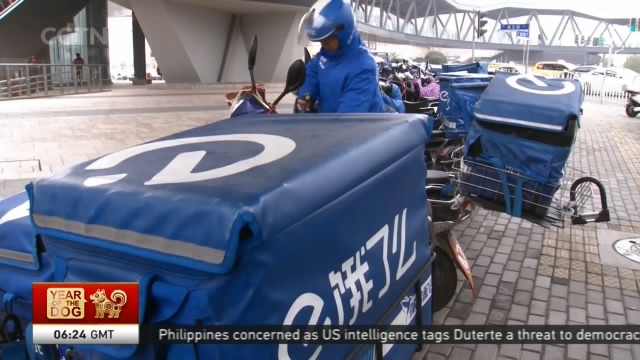
14:49, 21-Feb-2018
China Spring Festival: Concerns over food delivery apps

Today we continue our four-part series on China's logistics system. Food ordering apps in China have seen sizeable growth in the past few years. But their development is not without concern. Yang Chengxi explains.
China's internet firms have made urban life more convenient for nearly everyone. You want big meals for the holiday? There're apps for you to get food delivered right to your door. These services are so popular they're changing the city landscape. Wait till 12 p.m. and you'll see.
YANG CHENGXI SHANGHAI "And that means it's lunchtime. That's when the busy streets of Shanghai get a little bit more hectic. Many food deliverymen like the ones behind me are springing into action."
Xing Fuhao delivers up to 35 meals a day.
XING FUHAO FOOD DELIVERYMAN "I start delivering at 10 AM, and orders peak after 11. That's the busiest time of day."
As many deliverymen go fast on their scooters, Some have become a source of complaints for drivers on the road.
XUE JIAFENG, POLICE TRAFFIC POLICE OF SHANGHAI MUNICIPAL PUBLIC SAFETY BUREAU "Some of them run red lights or ride on the wrong side of the road. Because their salaries are based on how fast they deliver, they have an incentive to reach their customers quickly, therefore violate traffic rules."
The problem is obvious. Among the 117 traffic accidents involving delivery professionals in Shanghai in 2017, the number of riders with China's top two food delivery apps far exceeded that of package delivery services.
XUE JIAFENG, POLICE TRAFFIC POLICE OF SHANGHAI MUNICIPAL PUBLIC SAFETY BUREAU "This sector is expanding so quickly, it is now difficult to rely on us alone to maintain order."
The number one food delivery app, Eleme, has 3 million riders across China, and it is acknowledging the issue.
ZHOU ZHIHUI, VICE PRESIDENT DELIVERY OPERATION, ELEME "We notice that some deliverymen violate the traffic regulations. We are very concerned about rider safety, so last year, we became the first food delivery app to cooperate with traffic police in Beijing and Shanghai.”
Their collaboration involved assigning a code to every deliveryman and a 12-point traffic violation quota: similar to the system used for passenger vehicles.
ZHOU ZHIHUI, VICE PRESIDENT DELIVERY OPERATION, ELEME "Those who exceed the quota will be suspended and required to attend courses, and the more serious violators will be fired."
It also involves setting up a complaint report function in the app where citizens can flag traffic violations by deliverymen.
ZHOU ZHIHUI, VICE PRESIDENT DELIVERY OPERATION, ELEME "To encourage people to do this, we have set up a fund. Citizens will be rewarded with coupons once they report. Now we have received more than 200 reports”.
Shanghai traffic police say other similar apps like Meituan are following suit in working with the authorities, a necessary step to correct the course of this speedy industry. YCX, CGTN, SHANGHAI.

SITEMAP
Copyright © 2018 CGTN. Beijing ICP prepared NO.16065310-3
Copyright © 2018 CGTN. Beijing ICP prepared NO.16065310-3